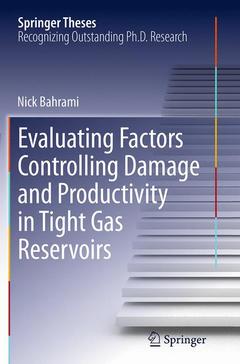Description
Evaluating Factors Controlling Damage and Productivity in Tight Gas Reservoirs, Softcover reprint of the original 1st ed. 2013
Springer Theses Series
Author: Bahrami Nick
Language: English
Subjects for Evaluating Factors Controlling Damage and Productivity...:
Publication date: 10-2016
Support: Print on demand
Approximative price 105.49 €
In Print (Delivery period: 15 days).
Add to cartPublication date: 12-2013
53 p. · 15.5x23.5 cm · Hardback
Description
/li>Contents
/li>Biography
/li>Comment
/li>
Tight gas reservoirs have very low permeability and porosity, which cannot be produced at economical flow rates unless the well is efficiently stimulated and completed using advanced and optimized technologies. Economical production on the basis of tight gas reservoirs is challenging in general, not only due to their very low permeability but also to several different forms of formation damage that can occur during drilling, completion, stimulation, and production operations.
This study demonstrates in detail the effects of different well and reservoir static and dynamic parameters that influence damage mechanisms and well productivity in tight gas reservoirs. Geomechanics, petrophysics, production and reservoir engineering expertise for reservoir characterization is combined with a reservoir simulation approach and core analysis experiments to understand the optimum strategy for tight gas development, delivering improved well productivity and gas recovery.
Nominated as an outstanding Ph.D. thesis by Curtin University, Australia
This work is a comprehensive study, focused on the evaluation of tight gas reservoir productivity from different perspectives – geomechanics, petrophysics, production engineering, and reservoir engineering – and integrates the results from different approaches to better characterize and understand the factors that can affect well productivity. Based on the evaluations, optimum strategies are proposed for tight gas reservoirs
This is a unique study, presenting new practical knowledge and proposing new dynamic data analysis methods for the evaluation of tight gas reservoirs. The new practical methods introduced are examined and validated using simulation models; further, a number of field examples are presented to confirm the reliability of the proposed methodologies
Due to the operational limitations and costs of data acquisition in tight gas reservoirs, there is normally a major lack of data in tight gas field studies, causing uncertainties in evaluation results. In this work, various types of tight gas reservoirs data are presented, which can serve as the typical input data for other tight gas field studies where only limited data is available
Includes supplementary material: sn.pub/extras




